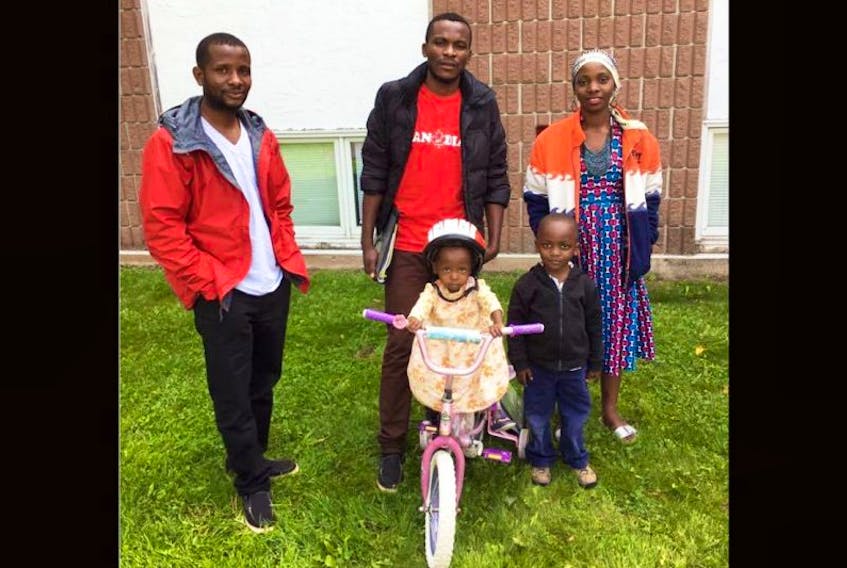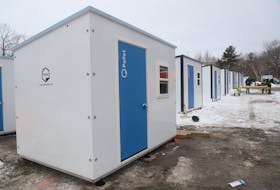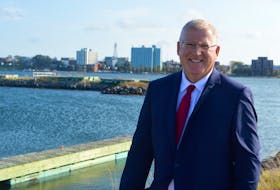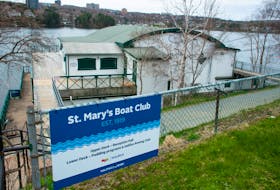Eight years later, Jafari and Kintu, along with Jafari’s wife and two young children, have been given a chance at a new start and are making a new home for themselves in Canada.
The Congolese family arrived in Sackville about two weeks ago, relieved to be able to leave behind a life of violence, poverty and hopelessness.
Jafari says he’s grateful they are finally here in Canada and the family is feeling overwhelmed by the welcome they’ve so far received since arriving at the Moncton airport on June 7.
Sackville is different than they had imagined, he says, but in a good way.
From all the stories they had heard about Canada before arriving here, they expected to see snow and also anticipated a more city-life setting (as many other refugees have settled in more urban areas such as Toronto and Vancouver).
But with his wife Mwaliasha already enjoying “the peaceful nature here” and his two kids – two-year-old Rehema and four-year-old Abdallah – settling in nicely, he says they are truly appreciative of this opportunity.
“If Sackville is what Canada looks like, then it’s good,” he says via his interpreter Maluk, a Mount Allison University commerce student from South Sudan who was also once a refugee at Kakuma. The family does speak a bit of English but is not yet fully comfortable speaking the language, preferring instead to converse in their native Swahili as they adjust to their new lives.
Kintu also is amazed by the quiet and the peace here, saying it is odd not to see people carrying guns or hearing gunshots and the constant fighting they had become accustomed to at Kakuma.
They are also adjusting to the cooler climate here, quite a difference from their time in Kenya, where the average daytime temperature would reach 40 degrees Celsius. The Kakuma camp is known for its extreme heat and lack of vegetation, being situated in a semi-arid desert environment.
Camp life was extremely rough, say the brothers, as Kakuma was faced with overcrowding, a lack of access to essential services, poisonous spiders and scorpions, outbreaks of malaria and cholera, and dwindling food rations.
“There was a lot of hardship, it wasn’t good,” says Jafari, who is now 23.
The Kakuma Refugee Camp, established in 1992 to serve Sudanese refugees, now houses approximately 180,000 people from more than 20 countries, who live in thatched roof huts, tents or mud abodes. There is little opportunity for the refugees to engage in economic activity within the camp, and little freedom of movement outside its boundaries. In many ways, writes one UNHCR (Union Refugee Agency in Canada) report, Kakuma is more like a prison than a refugee camp: “Here, children age to adulthood and hope fades to resignation.”
The congestion at the camp leads to regular acts of violence, conflicts and sexual assaults.
“Life there is so hard,” says 25-year-old Kintu, adding that refugees are only provided with what the UN rations out, with food being limited to six kilograms of food per month per family (which typically included beans, maize flour and cooking oil).
Kintu and Jafari have been living at Kakuma since 2009, when they were forced to flee their village in the Democratic Republic of the Congo following an attack from militants, when many of their fellow villagers were killed and their homes burned.
Violence and political turmoil in the central African nation have become commonplace over the past two-and-a-half decade; two civil wars have led to political instability, unrest and corruption. Armed groups continue to commit war crimes, according to a recent UNCHR report, ones which are often ethnically directed, driven by tensions over land ownership, tribal prejudice, and persecution.
The brothers escaped with their mother but had to leave their father behind, as he was one of the leaders of their Wabembe (Bembe) Tribe. (They have not heard from their father since being separated. They have posted letters through the Red Cross but have yet to receive any reliable information about his whereabouts.)
Jafari, Kintu and their mother then made their way to Ngoma, a district of Rwanda. But soon after arriving there, their mother was poisoned (an act they believe to have also been committed by militants). Scared to stay there and be killed themselves, they snuck out of Ngoma in the middle of the night, traveling into the woods to get away. Later coming across a woodsman, they asked him for a ride and he drove them as far as Nairobi before dropping them off. When the two began asking around about the UNCHR, they drew attention to themselves and were arrested and spent two days in jail. After being released, they were taken to the UN offices and were told they could go to the Kakuma Refugee Camp. A bus was arranged to take them there and they have been there ever since. Jafari was 15 at the time and Kintu was 17. Jafari met Mwaliasha in 2012, when she arrived at Kakuma.
The family says they found out almost three years ago they were approved for resettlement to Canada – so it has been a long, anxious wait. But they realize how fortunate they are; many refugees there have been waiting for more than two decades to hear news they can leave Kakuma and make a new home elsewhere.
Their move to Canada was made possible thanks to a group called the Sackville Refugee Response Coalition.
John Perkin, chair of the SRRC, said when refugees are approved for relocation into Canada, their file first goes to the central refugee office and then out to the various resettlement groups across the country, who then make the decision of matching up those individuals or families with their community.
The family, a bit unsure of what the future holds for them but thankful to be in a safe and comforting place, say they are amazed by the friendliness of the residents here, with many people stopping to chat, say hi and welcoming them to the community when they are out to events such as the Saturday morning farmers’ market. They want to thank everyone in Sackville who has made their resettlement to Canada a reality. They hope to be looking for jobs in the near future and would not rule out staying in Sackville if possible.
“Sackville is a great place, it has all the amenities you need here – the university, shops, the hospital. It’s just a great place,” says Jafari.









